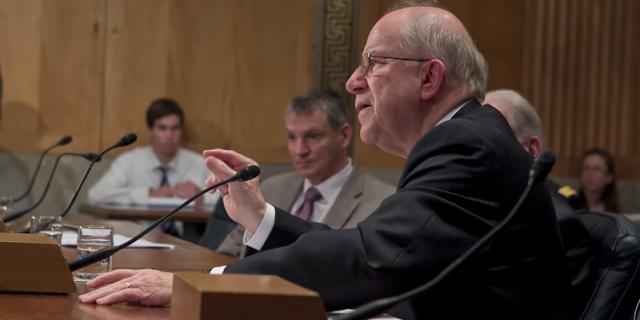WASHINGTON, D.C. May 21, 2012 Senior government officials and leaders in international education were convened on Monday to testify before the Senate Homeland Security and Governmental Affairs Subcommittee on Oversight of Government Management, the Federal Workforce, and the District of Columbia, chaired by Hawaii Senator Daniel Akaka.
The purpose of the hearing, entitled "A National Security Crisis: Foreign Language Capabilities in the Federal Government," was to examine the short-fall in personnel prepared to fill language-designated positions within the US Departments of Justice, Defense, State and other agencies, as well as learn about the effects of federal programs designed to increase the number of Americans skilled in priority world languages and regional knowledge. The Subcommittee invited testimony from three experts in business, foreign affairs, and education to testify on the nature of the "language gap," as well as recent alumni of federally-funded immersion programs to comment on the impact that overseas study has had on their lives.
In his testimony, the President of American Councils for International Education, Dr. Dan E. Davidson, noted that "If we are to meet the demands of keeping the peace, of reaching out to audiences and institutions around the world (and not just to the English speaking elites), and of detecting the intentions of those who would do us harm, then what is needed is a citizenry and a government workforce that includes substantial numbers of persons professionally fluent and culturally literate in the major languages and cultures of the world."
Dr. Davidson who also serves as the elected President for the Joint National Committee on Languages (JNCL), applauded the federal government's decision to raise the bar for language-designated positions across agencies to Level 3. "The real answer now for scaling up the system...is to begin the language training as far upstream as we can take it, with an extended sequence in the K-12 system, periodic opportunities for full immersion in the target culture, continued advanced -and content-oriented study in the university, and a strong language maintenance strategy for the federal and civilian work-corps employees along the career track."
Citing new models in study abroad and overseas immersion programs represented by the State Department's NSLI-Y, CLS and related teacher programs (TCLP and ISLI), as well as the National Security Education Program's Language Flagship, Dr. Davidson commented on the emergence of a new generation of highly proficient American professionals, alumni of these programs, who are going on to assume positions of responsibility in government, business and the third sector. These are individuals with highly-developed cultural and linguistic sensitivities capable of understanding and responding appropriately to a wide range of linguistic nuances and cultural signals, as they work in various professions in countries around the world. "The cultural component is central. It is not something generically "global," but specific to each individual language and culture," Davidson noted.
At the hearing, an alum of the Boren Program now serving in the US Army in Iraq and two alumni in The National Security Language Initiative for Youth (NSLI-Y) Program spoke about the impact that their study abroad experience had on their educational and career aspirations. In 2010, Michelle Dressner studied Russian language and culture in Nizhny Novgorod, Russia as part of the NSLI-Y Program, administered by American Councils. "Before NSLI-Y, I was hesitant to study Russian in college, afraid that it would not be the right path for me. After returning from Russia, I was confident that I not only wanted to study Russian in college, but that I wanted to pursue a career involving Russia and international relations" said Dressner, who is currently pursuing a double major in Russian Civilization and Economics at Smith College.
Another former NSLI-Y participant, Jeffrey Wood, who studied Chinese language and culture in Beijing, China in 2010 offered, "Until NSLI-Y, I had never flown in an airplane. After coming back from China, my life was forever changed. My perspectives, the stereotypes, and most importantly, my views about the globe and my career changed....Since my experience, I decided to pursue a future career in the Foreign Service, an international development organization, or IGO/NGO," said Wood, who is pursuing a double major in Global Affairs, with a concentration in International Development and Chinese at George Mason University.
Discussions also focused on the importance of federal-funded programs such as NSLI-Y, CLS and National Security Education Program's Flagship Program, and those supported by Title VI and Fulbright Hayes, as low cost, high-quality, proven models that are both scalable and unparalleled in the language proficiency levels they are producing.
American Councils for International Education is a leader in international education, academic exchange, and overseas language immersion, creating opportunities that prepare individuals and institutions for success in an increasingly interconnected world. Click here to learn more about American Councils.
The National Security Language Initiative for Youth (NSLI-Y) is a federally funded program at the US Department of State. It is administered by the American Councils for International Education. Click here to learn more about the NSLI-Y program.

